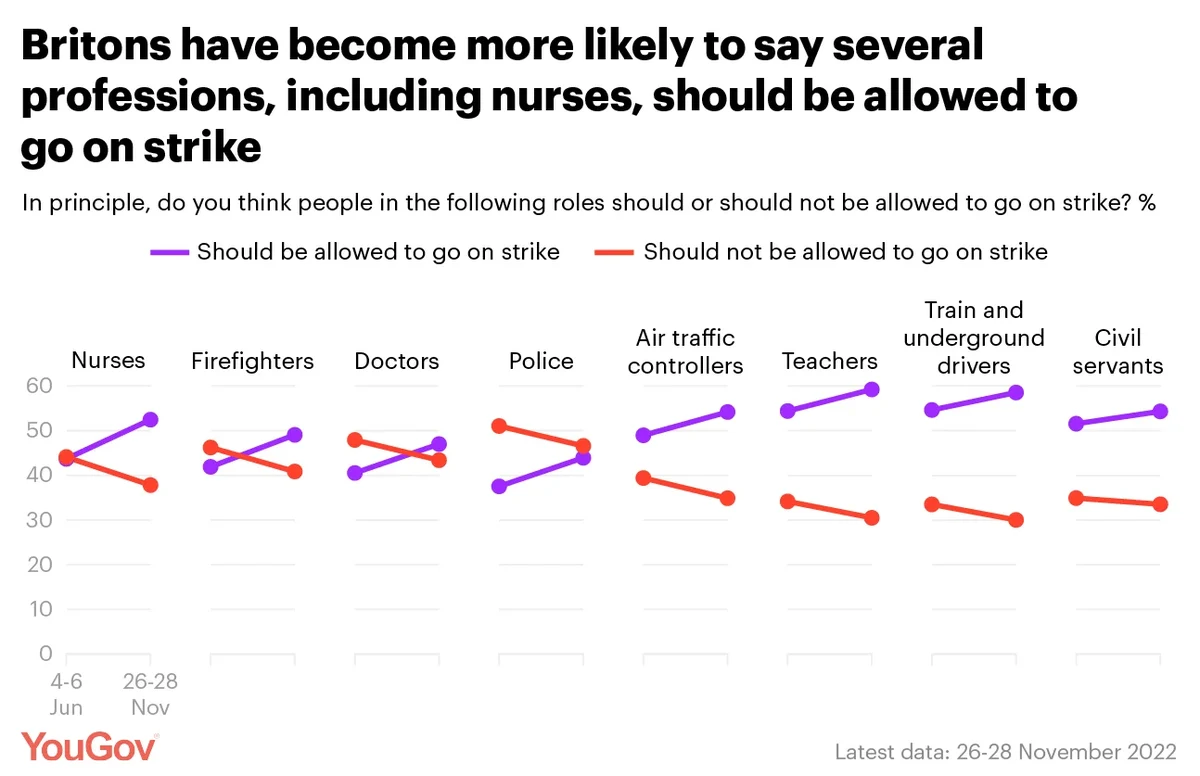Those who think trade unions play a negative role in Britain now equal to those who think their role is positive
Throughout 2022, multiple waves of strikes involving tens of thousands of workers have taken place, as trade unions, whose members have been hit by rising living costs, seek better conditions. These strikes have and are likely to continue to create significant disruption. But where do Britons currently stand on trade unions?
New YouGov tracker data finds that public opinion of trade unions is largely split. One in three (35%) think trade unions play a positive role in Britain today, compared to 34% who think they play a negative role. Significantly, the number who think trade unions play a negative role has risen noticeably, up nine points since June. By contrast, the number who think trade unions play a positive role is within the margin of error from the previous survey.
Opinion is strongly divided across party lines. More than half (60%) of Conservative voters believe trade unions play a negative role, compared to 17% who think their role is positive. The reverse applies to Labour voters, of whom 62% believe that trade unions play a positive role compared to 15% who think their role is negative.
When it comes to how well trade unions reflect ordinary working people in Britain, the public are similarly split, with 39% of the view that trade unions reflect this group of people well, compared to 38% who think they reflect them badly. Working Britons themselves, however, are more likely to think that ordinary workers are well-reflected by trade unions, by 45% to 33%.
Britons now most likely to think that trade unions are able to strike too easily
Whilst overall opinion towards trade unions has become more negative recently, the public are also increasingly unhappy over the apparent ease at which trade unions can take strike and the rules governing these strikes. Britons are now most likely to hold the view that trade unions are able to take strike action too easily and should have more restrictions placed upon them, at 34% compared to 27% who think the balance is right and 20% who think there are too many restrictions on trade unions.
The number who think trade union restrictions are too lax has increased nine points since June, and is up 13 points since December last year. By contrast, the number of those holding the other views has remained largely unchanged.
Britons now tend to support nurses’ right to strike
In the wake of the Royal College of Nursing’s announcement that it will go on strike for the first time in its 106-year history, YouGov tracker data shows that the public tend to support nurses’ right to strike. Half of the public (52%) now think nurses should be allowed to go on strike, compared to 38% who don’t. This is a significant change in favour of nurses’ right to strike compared to when we last asked the question back in June. At that time the public were evenly split 44% either way.
As well as nurses, new YouGov tracker data has also found increased support for the right to strike for doctors (+6), teachers (+5), police officers (+6), fire fighters (+7) and air traffic controllers (+5) since the question was last asked in June.

Photo: Getty







